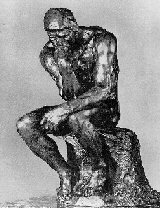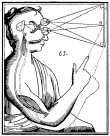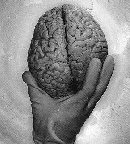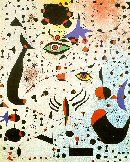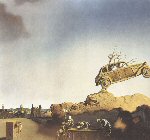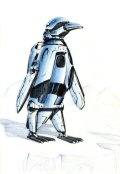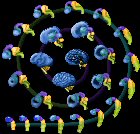Neuroscientist Susan Greenfield questions what technology is doing to human identity in Perspectives: Reinventing human identity (New Scientist of May 21, 2008.)
According to one estimate, Western children spend some six hours a day at a computer screen. Given the plasticity of the human brain, shouldn’t we ask how living effectively in two dimensions might leave its mark on neuronal connectivity?
Then she muses about whether it is a fact that interacting continuously with a fast-paced multimedia environment would predispose our brain to attention deficit disorder and, that
the visual world of the screen might affect our ability to develop the imagination and form the kind of abstract concepts that have until now come from first hearing stories, then reading on ones own. Will future generations prefer the here-and-now, opting for a strong sensory experience over a more personalized cognitive narrative? … Could we even end up living in a world where there is no personal narrative at all, no meaning, no context, just the experience of the thrill of the moment? Humans have always been hedonistic. Much of what we enjoy, from sex and drugs to fine food and wine, involves an abrogation of a sense of self. We “blow” our minds, “let ourselves go”: we are back in the booming, buzzing confusion of the moment, our identity suspended.
She calls this state the “Nobody” scenario, predisposed by twenty-first–century technology, different from the “Someone” identity of Western societies or the “Anyone” persona of collectivity cultures like communism. She also envisions a fourth “Eureka” scenario where creativity gives fulfillment and builds an individual identity.
[/en][it]
La neuroscienziata Susan Greenfield, su New Scientist del 21 Maggio 2008 si chiede qual è l’impatto della tecnologia sull’identità umana:
In accordo ad una stima, i bambini occidentali passano qualcosa come 6 ore al giorno di fronte ad uno schermo del computer. Data la plasticità del cervello umano, non dovremmo chiederci come il vivere di fatto in due dimensioni possa lasciare il segni sulle connessioni neuronali?
Quindi riflette sul fatto che una interazione continua con un ambiente multimediale veloce potrebbe predisporre il cervello al deficit di attenzione e che
il mondo visuale dello schermo potrebbe influire sulla nostra capacità di sviluppare l’immaginazione e formare il tipo di concetti astratti che fin’ora sono arrivati dall’ascolto delle storie e dalla lettura. Le future generazioni preferiranno il “qui e ora”, scegliendo un’esperienza sensoriale forte al posto di una narrativa cognitiva più personalizzata? […] Potrebbe anche essere che finiamo a vivere in un mondo dove non vi è alcuna narrativa personale, nessun significato, nessun contesto, solo l’esperienza del brivido del momento? Gli esseri umani sono sempre stati edonisti. La maggior parte di ciò di cui gioiamo, dal sesso alle droghe al buon cibo e al vino, comporta un’abrogazione del senso di sé. Ci troviamo nella rimbombante ebbrezza del momento, con la nostra identità sospesa.
Susan Greenfield chiama questo stato lo scenario “Nessuno”, indotto dalla tecnologia del ventunesimo secolo, diverso dall’identità “Qualcuno” delle società occidentali o della persona “Chiunque” delle culture collettivistiche quali il comunismo. Anche, lei concepisce un quarto scenario “Eureka” dove la creatività dà appagamento e crea un’identità individuale.
[/it] Leggi tutto “No identity”


